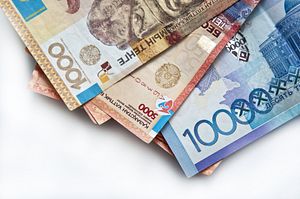Kazakhstan is moving ahead with plans to shift the national currency (the tenge) to a free-floating exchange rate. Kairat Kelimbetov, the governor of the National Bank of Kazakhstan, said in a press conference Wednesday that the country would widen the tenge’s trading band — raising the upper limit to 198 per dollar and maintaining the lower limit at 170.
According to a report from Bloomberg, Kelimbetov said that “this corridor allows the currency to fluctuate independently of the negative scenarios that may take shape outside Kazakhstan,” and that it will “answer the challenges in the coming six to twelve months.” The report continues:
Pressure is mounting on Kelimbetov to let the currency weaken after oil prices slumped and Russia’s ruble sank 46 percent last year, hurting the ability of Kazakh companies to compete with the nation’s biggest trading partner. Even after gaining since January, the ruble is still 39 percent weaker than a year ago, while the tenge has depreciated just 1.9 percent in the period.
The double trouble of the ruble’s drop and falling oil prices hit Kazakhstan hard. Bloomberg recently conducted a survey of economists’ forecasts which placed Kazakhstan in the 10 worst performing economies in 2015. With an expected growth rate of 1.2 percent (the World Bank forecasted 1.3 percent in May), Kazakhstan finds itself only two spots behind beleaguered Greece (which came in at eighth-worst, with forecasted growth of .09 percent). This is a far fall from a decade ago, when the dominant Central Asia economy experienced GDP growth of around 10 percent annually between 2000 and 2007.
One of the effects of the drop in the ruble has been a rush by Kazakh and other buyers to scoop up cheap Russian goods. Data from PriceWaterhouseCoopers indicated that Kazakhs and Belarusians bought nearly 20 percent of cars sold in Russia in November and December of last year, 90,000 out of 500,000 sold.
In February 2014, Kazakhstan devalued its currency 19 percent, in an attempt to remain competitive, but President Nursultan Nazarbayev has been defiant about devaluing the currency further. Moody’s Investor Service, according to Bloomberg, reported in March that it costs “Kazakhstan as much as $3 billion a month to keep the exchange rate at around 185 per dollar as falling oil prices and capital flight put pressure on the tenge.”
Kelimbetov told Bloomberg in June that Kazakhstan was moving toward a more flexible exchange rate — away from a fixed exchange rate with a range — but the shift will take three to five years.
Yesterday, Moody’s released a report saying that banks in countries of the former Soviet Union would continue to feel pain from the ruble’s drop and low oil prices. “We expect that CIS banks will be affected by lower oil prices and Russia’s recession through pressures on local currencies, declines in remittances from CIS nationals working in Russia, and lower exports from CIS countries to Russia,” Lev Dorf, an analyst at Moody’s, said in a press release. Kazakhstan will be more impacted than Uzbekistan, the report says, as Uzbekistan has “a tightly controlled currency regime under which the som is gradually devalued against the U.S. dollar.” But Belarus, Tajikistan, and Azerbaijan are likely to be most affected — they are, respectively, closer to Russia’s economy, more dependent on remittances, and heavily reliant on oil.
As Bradley Jardine pointed out in RFE/RL recently, while the Kazakh state is cognizant of its own financial troubles, some spending remains sacred and protected from cuts — namely EXPO 2017 and the 2022 Winter Olympics, which will be awarded to either Almaty or Beijing at the end of this month. These events are aimed at burnishing the international image of Kazakhstan, but may prove to be fiscally irresponsible. While Moody’s notes that government spending can help mitigate the crisis in Kazakhstan, stadiums and conference halls may not make Kazakh parents — who this fall will be paying for school lunches for the first time — very happy.
































